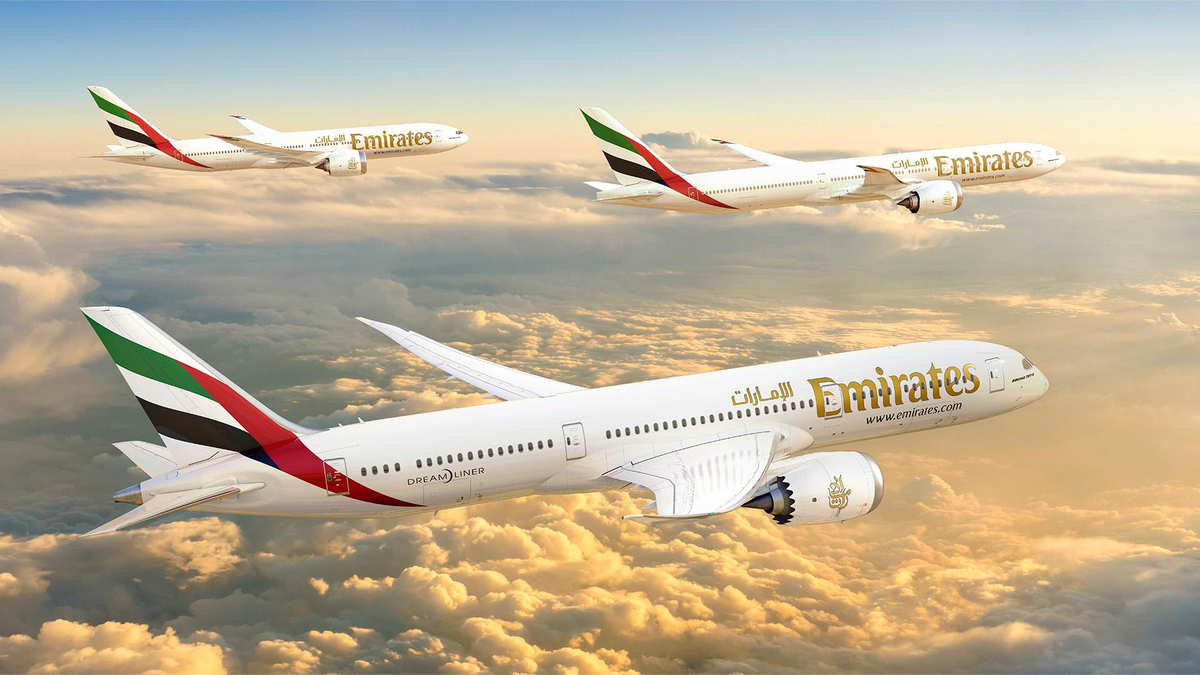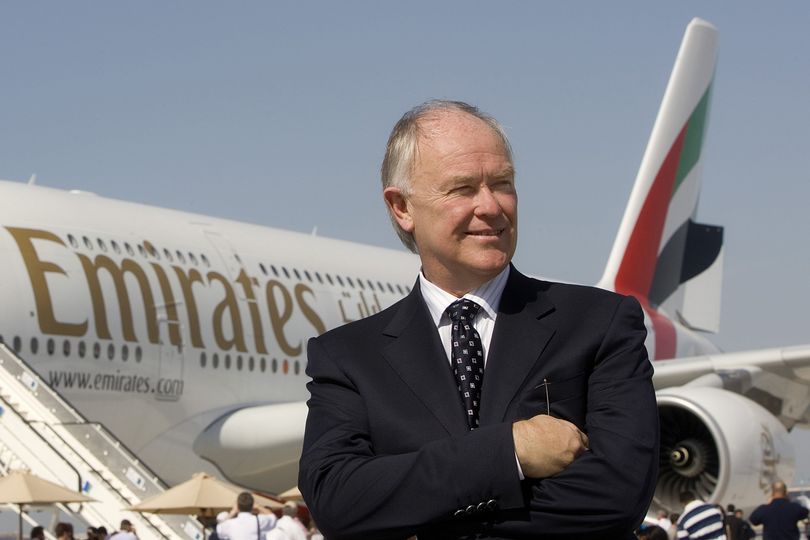Emirates trims Boeing orders as it curbs global ambition
Emirates' US$9bn order for the Boeing 787 accompanies Boeing 777X cutbacks in the post-A380 world.

Emirates scaled back a commitment to buy billions of dollars of Boeing 787 and 777X wide-body jets, completing a recalibration of ambitious plans that has also seen it slash orders for Airbus planes.
The world’s biggest long-haul airline will now take 30 Boeing 787s worth US$8.8 billion at list prices, together with 126 larger 777Xs, Chairman Sheikh Ahmed Bin Saeed Al Maktoum announced Wednesday at the Dubai Airshow.
That’s 40 planes fewer than originally planned, including six older 777s converted to the new version, and follows the slimming down of orders with Airbus by a net 20 jets earlier this week. Based on the most recent published list prices, the jettisoned commitments were worth about US$24 billion.
Emirates had held back on finalizing long-standing purchases – the 787 deal dated to 2017 and the 777X contract to 2014 – as it reviewed long-term fleet needs in light of an end to production of the A380 superjumbo. The Dubai-based company is also grappling with a slowing Gulf economy and concerns about the performance of some new plane models.
“We’ve been looking at the 787 for a very long time,” Emirates President Tim Clark said at the air show. “We want to get the plane into the network as soon as possible.”
Uncertainty in the air
The shrinking of the carrier’s commitments means Boeing and Airbus have together lost out on a potential 60 orders. At the same time, the manufacturers will be relieved to end the lingering uncertainty around blockbuster deals from an airline that’s helped drive wide-body plane production for years.
Emirates had already cut its backlog for the A380 double-decker by 39 planes in February after Airbus and engine provider Rolls-Royce declined to commit to a major upgrade. The move kicked off a sweeping fleet review, with the superjumbo ceding its role as the linchpin of a strategy that made Dubai the leading hub for flights around the globe. Airbus announced at the time that A380 production would end in 2021.
Emirates switched from its original plan to buy the 787-10 to the smaller 787-9 version of the Dreamliner, which costs US$5 million less, with deliveries commencing in 2023 rather than 2022.
Operating a medium-sized plane will open up city pairs with more modest passenger flows and allow the carrier to build frequencies on existing routes, Sheikh Ahmed said.
The 777X deal was reduced from 150 to 120 jets but topped up to 126 aircraft through the conversion of outstanding orders for six current-generation 777-300ERs to the upgraded model, which comes with new GE engines and composite wings to improve efficiency.
Talks with Boeing on the timing of 777 deliveries will take place in the next few weeks, with the variants also to be decided, Emirates said. The model’s first test flight has been held up by engine issues though Clark said it’s expected in a few months.
Rethinking Emirates' network in a post-A380 world
Emirates has been reviewing its route network as it grapples with slowing economic growth and the demise of the A380 superjumbo, a plane that’s been the cornerstone of its strategic thinking for almost two decades.
From late 2018 to mid-2019 Emirates spent conductred an extensive exercise which airline CEO Tim Clark described as "knocking down the network", to establish the optimum route profile both for itself and for the sheikdom
After establishing Dubai as the leading interchange for flights linking cities around the globe, Emirates is finding it tougher to find profitable new routes, especially with sluggish Persian Gulf economies weighing on margins. The state-owned airline was also unable to convince Airbus to upgrade the A380, forcing it to buy smaller jets requiring a recalibration of its super-hub model.
“We haven’t been growing at the pace we used to because of geopolitical issues in the region and elsewhere,” Clark admitted, speaking at the 2019 Arabian Travel Market convention in April this year.
“But that’s given us time to take stock of what the network is going to look like in five to ten years, and what the fleet fit in that network and the type of aircraft is going to be.”
Emirates dropped the A380 from its long-term plans after Airbus and engine maker Rolls-Royce declined to invest in the double-decker, leaving a choice of buying “the same aircraft” or walking away, Clark said.
Moving to two-engine jets will offer fuel savings but carry fewer people, complicating the Emirates operating model, which is built around waves of mass departures that are closely timed to maximize the scope for transfers between flights.
Dubai Airports Chief Executive Officer Paul Griffiths said separately at the 2019 CAPA Middle East & Africa Aviation Summit, also held in Dubai, that Airbus’s move to terminate the A380 program following the Emirates decision represents a challenge for the hub model because of the limited flight capacity at many airports.
While Dubai’s new Al Maktoum facility will have plenty of room for additional flights to make up for the eventual retirement of the A380, other hubs – such as London Heathrow – are more constrained with little room at present for extra services.
More 'fifth freedom' flights?
Though all Emirates routes are “under the microscope” it remains possible that the airline could seek to operate more controversial “fifth freedom” routes to the U.S., in which flights originating in Dubai pick up passengers in a third country before taking them on to the U.S., Clark said.
Both a daily A380 service from Milan to New York and a Boeing 777 operation from Athens to Newark, New Jersey, are doing well and “the temptation is to do more,” he said. The routes have stoked anger among some U.S. carriers and politicians who say Emirates and other Gulf carriers benefit from illegal aid, something they have denied.
Clark also said that Emirates will become “far more integrated” with short-haul sister company FlyDubai, though there are no plans to merge the pair. The carriers have begun attaching their flight code to each other’s services and are rationalizing their networks to avoid duplicating routes.


Singapore Airlines - KrisFlyer
14 Jan 2014
Total posts 341
Why Emirates would what the ghastly Nightmare Liner that is the B787 is beyond me when they will also be flying the far superior A350!! Stick to one (and hopefully for Pax benefits, the A350)
04 Dec 2017
Total posts 3
Because it's a better plane it burns less fuel
Qantas - Qantas Frequent Flyer
02 Sep 2018
Total posts 153
I think reducing aircraft capacity whilst focusing on fleet efficiency is going to be important for them going forward. With ultra long haul routes like Sydney to London coming in the future, it will certainly decrease capacity for Emirates travel. Reducing capacity with the retirement of the A380 and replacement with the 777, 787, A350 will be smart to ensure profits. Not overflooding markets with capacity is as important as filling market capacity.
Qantas - Qantas Frequent Flyer
09 May 2013
Total posts 138
Not sure if the Sydney London direct connection is going to be a game changer. Knowing how QF operates, they would price the non stop to be out of reach for most customers, who would then end up flying hub airlines.
Check out the price of Brisbane - Chicago QF flights, in economy it is $400 more than taking a stop in los angeles or san francisco, and business class is like $3000 more.
Qantas - Qantas Frequent Flyer
05 Oct 2016
Total posts 96
Exactly the same with the PER/LHR option compared to via SIN. I take the SIN option because of the price difference doesn't justify it, even though I'd love to do the direct... J is usually 3k more via PER and it's still a connection for me anyway. I think last time i analysed it, some 70+ % of the 95% full PER/LHR flights was traffic direct out of PER!
Qantas - Qantas Frequent Flyer
01 May 2019
Total posts 39
Emirates ordered 50 Airbus A350's (up from 30) and said that they are still looking at the A330. The haircut at Dubai was taken by Boeing with a loss of 30 Boeing 777x's and as reduction from a tentative order for 40 of 787's to a firm order of 30. Add the 737 Max issues and Boeing management must be under a great deal of stress.
Qantas - Qantas Frequent Flyer
05 Oct 2016
Total posts 96
This para in the article is a giveaway, that the EK A380 everywhere model is flawed, they've realised what actually works better for most.
"Operating a medium-sized plane will open up city pairs with more modest passenger flows and allow the carrier to build frequencies on existing routes, Sheikh Ahmed said."
Air New Zealand - Airpoints
12 Feb 2016
Total posts 22
I understand the logic but i wonder whether Airbus has pulled the plug on the 380 a little too soon.
Hi Guest, join in the discussion on Emirates trims Boeing orders as it curbs global ambition